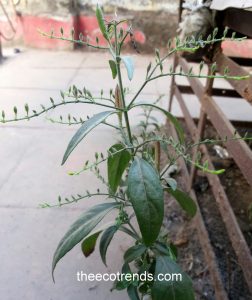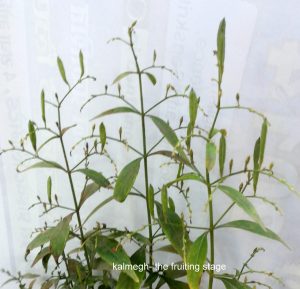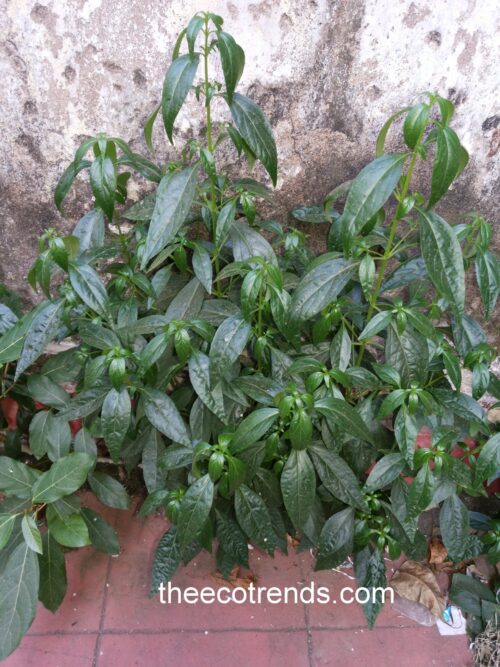Kirata, Kalmegh or Chiraita is a wild herb with bitter taste. It grows in the wild in forests, wastelands, and along roadsides. It is popularly known as the king of bitters.
Kalmegh belongs to the family Acanthaceae and genus Andrographis. Andrographis paniculata is a common species of this genus.
Kirata has several vernacular names. Kirata is its Sanskrit name. Buminimba and Yavatikta are its Hindi names.
In English it is called as Kriate, Kre, Kariyat and creat.It is called as Alui in Bengali whereas in Gujrti it is called as Lilum Kariyatun.
In Telugu it is called as Nelavembu and in Marathi it is called as Olikiryata. In Ayurveda it is popularly known as Kalmegh, Bhuminimba, and Vishwambhar etc. In Unani Medicinal system it is known as Kiryat.
Kirata is erect with a height of 30 to 110cm. The stem is slender, dark green in colour and square in cross section. It has longitudinal furrows and wings along angles on stems.

The leaves are lance-shaped having hairless blades and measure up to 8 cm in length. These are about 2.5 cm wide. The inflorescence is spreading raceme. Fruit is capsule which is about 2cm in length and few cm in width. Many yellow brown seeds are contained in it.

Medicinal Properties
After an extensive surveys and interviews with traditional herbalists, and tribal vaidyas it has been recorded that the extracts and Panchanga (extracts of all the five parts) are used to cure a number of ailments. The plant has been adopted in most of the traditional, Ethnoherbological, Siddha, Unani, and Homoeopathic systems.
Kalmegh which is taxonomically known as Andrographis paniculata) is a bitter tonic. It is useful in treating fever, the liver disorders, worms, abdominal gas and constipation.
Kalmegh has been reported to have antipyretic, anti-inflammatory, antibacterial, antioxidant, anti- parasitic and hepatoprotective properties. It can also be used to treat children suffering from the liver and digestive system related problems.
Kalmegh is found growing wild throughout the plains and hills of tropical India, from Uttar Pradesh to Kerala, and also in Bangladesh, Pakistan and all South East Asian countries. It is cultivated as an ornamental garden plant.
All part of the Kalmegh plant is extremely bitter due to which plant is known as king of bitter. This plant is called Hempedu Bumi (meaning bile of earth) in Malaysia.
In brief the medicinal, Ethnoherbological properties of Kalmegh or Kirata are mentioned below.
- It is anti-bacterial and anti-fungal
- Its extract is reported to be anti-viral as well
- Its extract is anti-pyretic, adoptogenic, and anti- inflammatory
- Its extract is liver protecting and immunity booster
- It is carminative, diuretic, and hypocholesterolemic
- It is blood purifying
In traditional medicine Kalmegh is used for treating leprosy, gonorrhea, scabies, boils, skin eruptions, etc. Due to its blood purification properties. Its decoction prevents and treats the liver diseases and fever.
The decoction or Kwath or infusion of Kalmegh is also used in sluggish liver, indigestion, bowel irregularity, anorexia, abdominal gas and diarrhea. Fresh leaf juice is given to prevent excessive bleeding during periods.
In Jharkhand state of India dried Kalmegh is a source of income for local tribal people. However, it is sold in shops as well.




